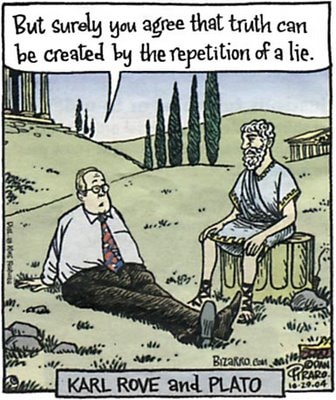Joe Romm, inspired by this Huffington Post piece, is going back to one of his top themes—you have to talk about the science of climate change; you can’t run away from it. That’s the blazoned headline—further down, Romm admits that the issue of how to communicate on this topic is exceedingly complicated, and
…nobody has figured out the best winning message – probably because there is no one-size-fits-all message, particularly in the face of the most well-funded and sophisticated disinformation campaign in human history. That disinformation campaign complicates all messaging — and all message testing — since it is so pervasive and well-designed.
I agree with this last point most of all—and to me, it may possibly point to at least one effective communications strategy. However, I must admit that I’m hesitant to prescribe any some overarching guru messaging answer, for the reasons that Romm himself so eloquently explains. But maybe I can at least break the problem down a bit.
First, you really can’t talk about having a message strategy on global warming without talking about who the messengers are. Once you put it this way, you find that there has always been communication about the science of global warming—from scientists and scientific organizations, from science bloggers like Romm, RealClimate.org, DeSmogBlog, etc. This is just as it should be: It is important to set the record straight when false claims are aired and to explain how powerful the scientific consensus is, as well as to explain how we know what we know and what the mechanisms of climate change are.
However, this message, being fairly technical, can be difficult and audience-limiting. What Romm seems to be getting, at is the idea that large environmental NGOs, as well as the White House, ought also to be talking about the science of climate change, rather than using a poll-tested economic message about green jobs, competitiveness, and so on. This is trickier.
The core problem is that the issue is now completely partisan. We’re at a point now where many Republicans who hear about climate science shut it out almost immediately. They think it’s a hoax. Meanwhile, the political reality is that you can’t do anything about the issue at least until the next election, due to the composition of Congress.
Finally, if you put a scientific message out there at the highest levels–e.g., from the president–you will quickly get a massive surge of doubt mongering and attacks on its technical validity. We know this–this is what Romm means about the “misinformation campaign”–and when it is unleashed, most Americans will not know how to judge who’s right and wrong. They’ll throw up their hands, frustrated, disspirited, even angry.
In this context, do you really want the President arguing the science?
Here’s what I think. First, I think that the White House absolutely should have responded to “ClimateGate.” Romm suggests plans were ditched to do so. If so, that was a big mistake, because it allowed deniers to define the issue at a time when they had a far bigger media megaphone than they usually do. We’ve been living with the consequences ever since.
Second, I think president Obama should have seized the initiative more during the first two years of his presidency with a major speech on climate change—science and all—to put far more weight behind the issue than he ultimately did. That was the time to hit the issue hard, and to make a convincing case to the public, at least in part a scientific case. And it wasn’t done.
Third, I think that making people realize how climate change is going to affect them, wherever they live, is very important. States and localities should be hearing regularly about how their world is going to be changing, because it is doing so already. Communicating about local impacts of climate change is an ongoing process and, in fact, needs to be a constant and unending one.
Fourth—if we want to talk about the science of climate in a more concerted way right now, I want to throw out there the suggestion that the message may actually be about the scandal of anti-science. It would be an expansion of the theme that Paul Krugman hits today—the complete outrage of ignoring science at our peril.
Talking about the science inevitably leads to a “he said, she said” over its validity. If you have a big enough audience (as Kerry Emanuel did last week) then there will be an assault on your facts. It’s like clockwork.
But talking about the anti-science puts the “he said, she said” in its needed context. When skeptics and deniers try to argue back scientifically, this message essentially says, I told you so. It is also highly motivating, and generates outrage.
So I think that, while on the defensive about this issue (as we are now), this may be the way to be discussing it. However, I also hope this will be taken as a suggestion, not as an answer. Like Romm, I caution that this topic is very complex and difficult, there is no one-size-fits-all, there are many messengers with many roles to play–and we should be skeptical of anyone claiming to have the absolute final answer.
Subscribe to our newsletter
Stay up to date with DeSmog news and alerts







